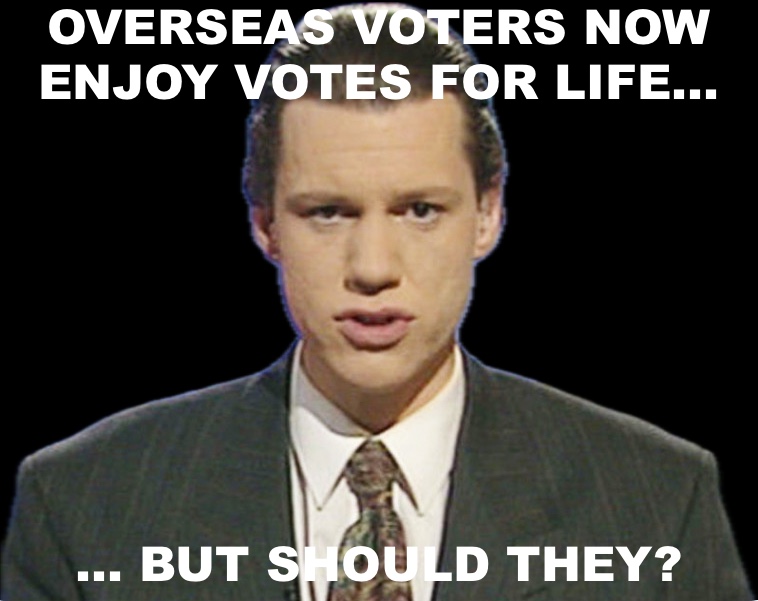
When I left the UK for Canada in 2010, a clock started ticking. At the time, electoral law only allowed a UK citizen eligibility to vote should they have lived within the UK in the past 15 years.
By luck, as I’d almost run down the clock, the current UK parliament chose to change that law and remove the 15 year limit. This means allowing overseas citizens a vote for life.
This was something I remember first hearing about as a party pledge by David Cameron, but it has deeper rootes and is something which has been advocated for from within the Conservative Party itself since the 1980s.
The idea was certainly controversial in some quarters. The Daily Mail was quick to point out all the tax exiles who’d receive a vote in exchange for contributing nothing back to the UK.
And although the initiative eventually gained cross-party support, it’s also had its criticism, with some in the opposition Labour Party advocating in favour of keeping the 15 year limit in place, arguing the true purpose of the bill was to create a donation loophole.
Hidden Motives?
Given the government’s record during the past several years, it’s hard not to raise a quizzical eyebrow at this seeming magnanimous act.
And their track record is bad. We’ve had the overtly anti-democratic 2019 prorogation of parliament which ended up being overturned by the High Court of Justice.
We’re having a return to first-past-the-post in mayoral elections this year beginning with London’s upcoming mayoral election.
And we’ve also seen the needless and problematic introduction of voter ID for all elections in the UK. And whilst voter ID is common in Europe, we need to remember that this may work well in countries with national identity cards, but the UK doesn’t have national IDs. Brits have been historically reticent to towards the idea of a national identity card, and as a result the choices for acceptable proof of identity at the polling stations may favour some demographics more than others.
But I digress. The point I’m making is this evidence would seem to suggest such a government wouldn’t just decide to remove the limit on oversees voting unless they thought it would give them an electoral advantage.
When the change was debated in parliament, Cat Smith – Labour MP for Lancaster & Fleetwood – advocated in favour of keeping the 15 year limit in place, arguing the true purpose of the bill was to create a donation loophole, one which would mainly benefit the governing Conservatives.
When you have this in mind, the abolition of the 15 year rule looks less like an outlier in the narrative of this government.
What’s the Renewal Process Like?
If you’re one of those people who’s eligible to regain your right to vote, the registration process is quite seamless.
If you’ve been registered in the recent past, the electoral services of the borough in which you’re registered will send you an email with a letter attached as a PDF explaining your registration is about to expire and what to do about it.
That essentially involves clicking on a link which will take you to the government’s Register to Vote page. You can also use this link if you’ve not been registered to vote recently, but are now eligible once again.
From there it’s a straight forward process to re-register. They’ll take your personal details, including passport and national insurance numbers, should you have them. They’ll ask at what address you were last registered to vote when you lived in the UK.
The whole process takes less than 10 minutes, and once you’re done they’ll send the request to the local electoral services of the borough you’re re-registering with.
By default, you get registered to vote in person, but fear not! At the end of the registration process you can immediately click to a link to register for postal voting – or if you prefer, proxy voting. You don’t need to wait for your registration to be approved and the process makes this clear and encourages you to proceed. Again, this process takes under 10 minutes.
And that’s it, you’re done! Your local electoral services office will send confirmation within a few days that you’re successfully back on the electoral register. This letter will state you must vote in person, but don’t fear as within another day or two another letter will arrive confirming you’re now registered to vote by post or proxy depending on which one you applied for.
I made a point earlier of critiquing the current government for wanting to make democratic participation harder, but whether you agree with me or not, there’s no question this registration process is straight forward and with little red tape or bureaucratic trickery.
Live Remotely, Vote Locally

There’s an oddity to having your vote tied to a geographic constituency in the UK, even though you’re living abroad. Setting aside the disenfranchising nature of the first past the post system and how that determines what your vote is worth, to me it doesn’t make sense to have my MP be someone representing local interests.
For example, in terms of population The Isle of Wight is the largest constituency in the UK with 113,021, and the smallest of Na h-Eileanan an Iar in Scotland has an electorate of 20,887.
The number of UK citizens in the diaspora is an estimated 200,000, far exceeding any existing constituency. Whilst it’s hard to properly estimate the number of Brits living in North America – the UK does not require its citizens to report themselves to their local consulate – there’s likely over 125 million Brits living in North America alone. None of us have local representation in spite of our size exceeding even the largest UK constituency.
Let’s take a look at how France handles overseas voting. On French election day here in Montreal you’ll see queues of French voters lined up in Outremont to vote in person.
That’s right! French nationals have the option of voting in person, even though they’re not living in France. But which of their constituencies are they voting for? Let me introduce you to the Circonscriptions législatives des Français établis hors de France, or the constituencies for French residents overseas.
Essentially, these are additional constituencies to represent French citizens living abroad. They’re quite large geographically, for example there’s one constituency for the entirety of North America (Canada and the USA). Each constituency returns one elected member of the national assembly who represents and advocates for their constituents outside of France.
I’d love to see the UK implement something like this, as I don’t think overseas voters don’t have their interests represented at all. I once even wrote to my MP about it, arguing the importance of UK citizens living overseas making the following points:
- Overseas citizens can be more directly affected by foreign affair decisions taken than those back home yet do not have direct representation.
- A British National residing overseas is automatically an ambassador for the UK, by virtue of the way they conduct themselves as they go about their day-to-day life. Locals will find that their impressions of the UK come from the British nationals they encounter, and as such we each have a small but relevant role in nurturing the relationship of the UK with the country or state in which we reside.
- Overseas citizens working for businesses overseas open up lines of communication to business in the UK, indirectly benefiting the UK economy.
- An MP spending time in their off-shore constituency could bring first hand experience of life abroad directly to Westminster.
- Other countries such as France and Italy have shown us the benefits of having MPs in other countries to represent their citizens.
- The number of citizens some regions equals or even exceeds the number of resident citizens in a domestic constituency.
- Overseas citizens form communities in their own right, just as in need of representation as constituencies back home.
The Two Vote Dilemma

I’ve had debates with other Brits in the diaspora about whether it’s “right” to take part in the election of a country you no longer live in. But elections in the UK can impact those living outside.
The most extreme example I can think of in support of it is for Brits who’d been living in Europe for more than 15 years at the time of the Brexit referendum and who didn’t get a say in a decision which would potentially affect their right to continue living in the EU.
And even from out here in Canada, I don’t know for certain I won’t return to the UK one day with my family. I want to continue to get a say in our democracy, as those policies may yet directly affect me and my family in the future.
Democracy is precious, imperfect and hard-won. So, I can’t help but come down on the side of the argument that not only should Brits abroad retain the right to vote, they also have a moral duty to register and vote in each election.
Progress is Made
These kinds of discussions are always likely to prove controversial, but I do see the abolition of the 15 year rule as progress in a positive direction.
But here’s the thing, by tying overseas votes to local constituencies the impact of the UK diaspora on election outcomes will be minimal. Nevertheless, it will still help strengthen the feeling of inclusion overseas citizens have with what’s happening in the UK, and that has to be a positive thing.
The issues with party donations are worrying, but should be addressed in a wider context by limiting the amount of donations a party can accept, and also ensuring there’s a visible public register so voters know where these donations are coming from. In this way the electoral playing field can be levelled in a wider context and voters can continue to have their say in our democracy, no matter where they reside or for how long they’re away.
If you’re a UK citizen who’s lived overseas for more than 15 years, you can re-register to vote right now at www.gov.uk/register-to-vote! What are you waiting for?
Enjoy this post? You may also enjoy these: